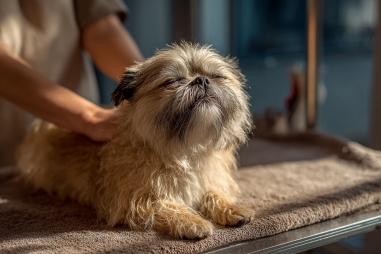If you’re a proud owner or considering bringing home a Brussels Griffon, one question you might have is, “How long will my furry friend be with me?” Like all dog breeds, their lifespan and quality of life depend on many factors ranging from genetics to everyday care. In this article, we’ll explore the average lifespan of Brussels Griffons, what influences their longevity, and how you can help your little companion live a long, happy, healthy life.
Average Lifespan of Brussels Griffons
Brussels Griffons are a small breed known for their big personality and expressive faces. On average, these delightful dogs tend to live between 12 and 15 years. This lifespan is fairly typical for small breeds, which often enjoy longer lives compared to larger dogs. In some cases, with excellent care and a bit of luck, Brussels Griffons can surpass 15 years and continue to be lively and affectionate companions well into their senior years.
Genetic and Environmental Factors Affecting Longevity
Just like people, the genes your Brussels Griffon inherits play a crucial role in their overall lifespan. Some dogs come from bloodlines with fewer health problems, while others may be predisposed to specific conditions common in the breed, such as respiratory issues due to their flat faces or heart problems.
Environmental factors also have a huge impact. Dogs who live in safe, stress-free environments with consistent routines tend to fare better. Exposure to harmful toxins, secondhand smoke, or stressful situations can lower their quality of life and shorten their lifespan. Early socialization and mental stimulation can help strengthen your Griffon’s immune system and emotional well-being.
Health Practices That Extend Longevity
Proactive health care is vital for helping Brussels Griffons reach the top of their life expectancy range. Here are some essential practices:
- Regular Veterinary Check-ups: Routine exams allow your vet to detect health problems early, especially chronic or age-related diseases.
- Vaccinations and Parasite Prevention: Keeping vaccinations up to date and protecting your dog from fleas, ticks, and worms helps prevent illnesses that can affect longevity.
- Dental Care: Dental disease is surprisingly common but preventable. Brushing your dog’s teeth regularly or providing dental treats can reduce the risk of infections that threaten overall health.
- Spaying or Neutering: Sterilization not only helps manage pet populations but can lower risks of certain cancers and hormonal conditions.
Nutrition and Exercise Impact on Lifespan
Diet and physical activity are two of the most controllable factors when it comes to your Brussels Griffon’s health.
Nutrition
Feeding a well-balanced, high-quality dog food tailored to your Brussels Griffon’s age, weight, and activity level provides the nutrients necessary for vitality and longevity. Obesity is a common problem that can shorten your dog’s life by increasing the risk of diabetes, joint problems, and heart disease. Avoid overfeeding treats and table scraps, and ask your vet about portion sizes specific to your dog’s lifestyle.
Exercise
Though small in size, Brussels Griffons are active and curious dogs who need regular exercise to maintain muscle tone, joint health, and mental stimulation. Daily walks, playtime, and interactive toys can help keep your companion fit and engaged. However, avoid strenuous activity that might stress their respiratory system because of their brachycephalic (short-nosed) nature.
Signs of Aging and Senior Dog Care
When your Brussels Griffon enters their senior years—typically around age 8 to 10—it’s important to recognize the signs of aging and adjust their care accordingly. Common aging signs include:
- Slower mobility or stiffness
- Graying fur, especially around the muzzle
- Changes in appetite or weight
- Dental wear or bad breath
- Loss of hearing or vision
- Changes in behavior such as increased sleeping or confusion
Senior Brussels Griffons may benefit from more frequent veterinary visits to monitor chronic conditions like arthritis or heart disease. Modifying their environment with comfortable bedding, easy access to food and water, and ramps to avoid stairs can significantly improve their comfort and quality of life.
Tips for Maximizing Quality of Life
Ultimately, a longer life is not just about years but the quality of those years. Here are some tips to ensure your Brussels Griffon enjoys every moment:
- Provide Mental Stimulation: Puzzle toys, training, and new experiences help keep your dog’s mind sharp.
- Maintain Social Interaction: Brussels Griffons thrive on companionship, so spend quality time with your pet and, if possible, arrange safe playdates.
- Manage Weight: Keep an eye on your dog’s weight and consult your vet to tailor their diet and exercise plans.
- Regular Grooming: Their wiry or smooth coat needs consistent grooming to prevent skin issues and keep them comfortable.
- Watch for Health Changes: Being attentive to any unusual symptoms or behaviors can help catch problems early.
Additionally, having a strong bond with your Brussels Griffon and understanding their unique personality and needs will make every phase of life fulfilling and memorable.
Knowing how long Brussels Griffons typically live and what affects their lifespan empowers you to make the best choices for your beloved companion. With proper care, attention to health, and lots of love, your Griffon can enjoy many joyful years by your side.







